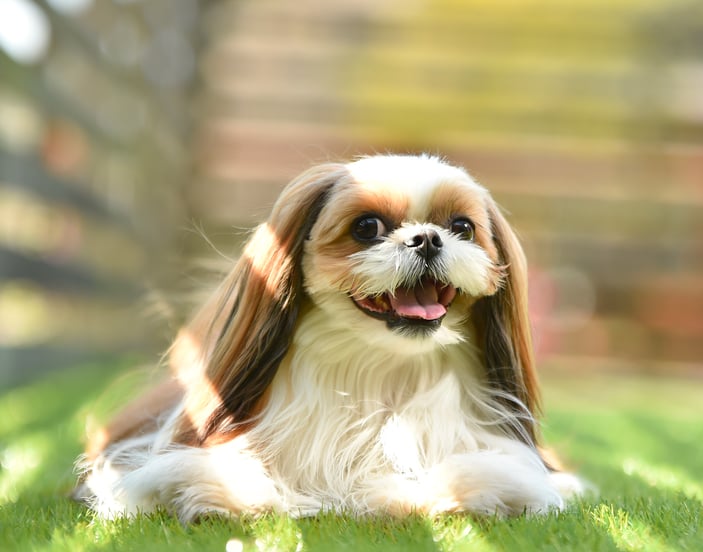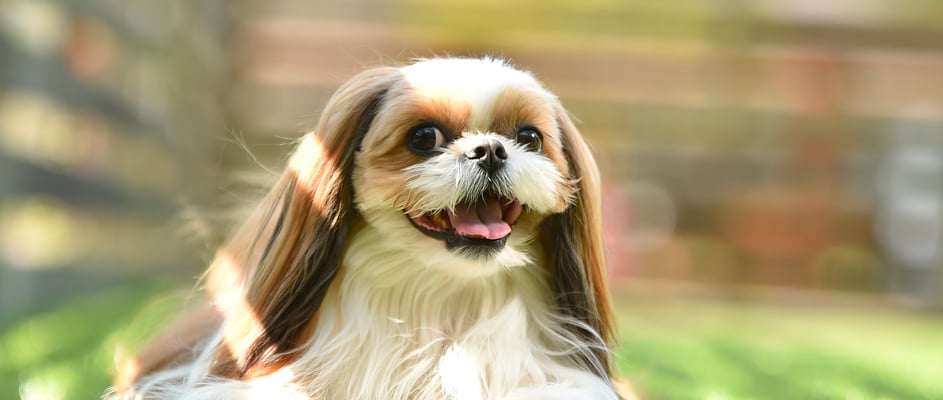The guide to owning a Shih Tzu.
Want to know everything there is to know about finding the right dog for you? Submit your email below, and we’ll send you a one-stop guide to help you on your pet-ownership journey.
Jump to:
Stats at a glance.
A History of Shih Tzus.
Meet the Shih Tzu, or as some call them, the "lion dog." These charming little companions have a royal vibe and a face that could melt anyone’s heart.
The Shih Tzu dog is said to have originated in Ancient China, although their roots trace back to Tibet.
Legends mention that the Tibetan lion dog was a gift from Tibetan monasteries to Chinese royalty, leading to a selective breeding program of Shih that polished their regal look.
Some say they were developed by crossing the Pekingese and the Lhasa Apso, with the end goal of creating the ultimate lapdog—even referred to as the "chrysanthemum dog" due to that adorable face.
Though small in size, these pups were guardians of Chinese palaces and favourite pets of emperors.
Over time, various kennel clubs, including the Kennel Club in the UK and the American Kennel Club in the U.S., officially recognised the breed.
If you’d enjoy more stories about dogs with fascinating backstories, see our "Discovering Top Ten Rarest Dog Breeds" piece.
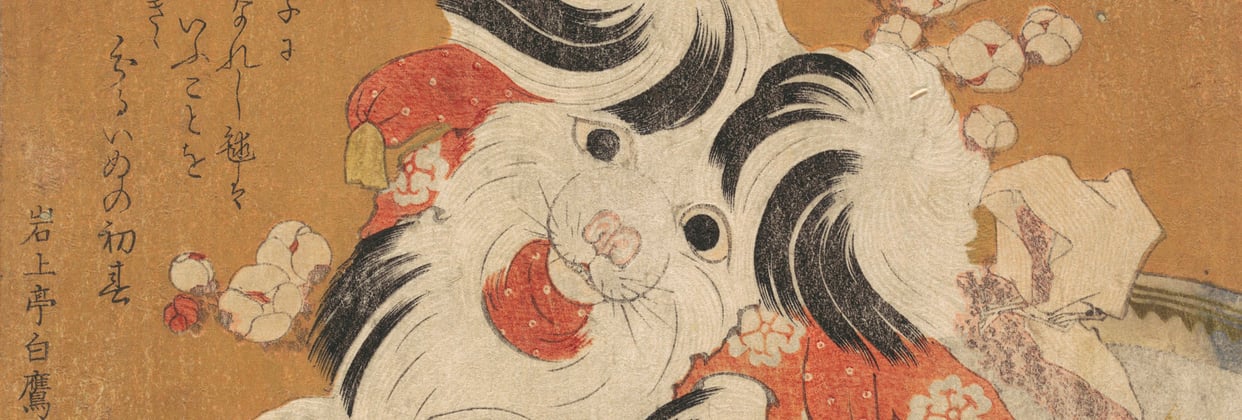

How much is a Shih Tzu puppy (UK)?
Thinking of buying a Shih Tzu puppy? Expect to spend between £600 and £2,500, depending on things like lineage, breeder reputation, and coat colours.
If a price seems too good to be true, be careful. Always look for a responsible dog breeder who puts health first, checking for potential brachycephalic issues or the common health problems in Shih Tzus.
If you’re new to the puppy game, don’t miss our puppy essentials new owners guide for the best first steps. Key things to consider when selecting your pup:
Meeting at least one parent dog.
Verifying vet health checks.
Observing that the puppies live in a safe environment.
And of course, you could explore adoption from a rescue group that specialises in Shih Tzus—it’s often cheaper, and many rescue dogs are just waiting for a new family.
Colours and coat types.
The Shih Tzu coat may come in many colours—black, white, gold, brindle, and even a mix. That luscious, long coat is famously glamorous.
Some people opt for a puppy cut, a shorter trim that’s easier to maintain. But if you love your Shih Tzu looking show-ready, you’ll want consistent grooming to keep tangles at bay.
They might have hair around their eyes that needs trimming to maintain clear vision. Your neighbour might tell you they look like baby Ewoks, and you’d probably agree.





Size and weight.
Small in size is the Shih Tzu hallmark. Standing 20–28cm tall and weighing 4–8 kg, they’re easy to carry around. It’s like holding a living teddy bear.
Even though they’re tiny, these pals still deserve respectful handling, especially with those floppy ears and short muzzle. If you want to compare them with other petite canines, read our post on the top "10 Small Breeds".
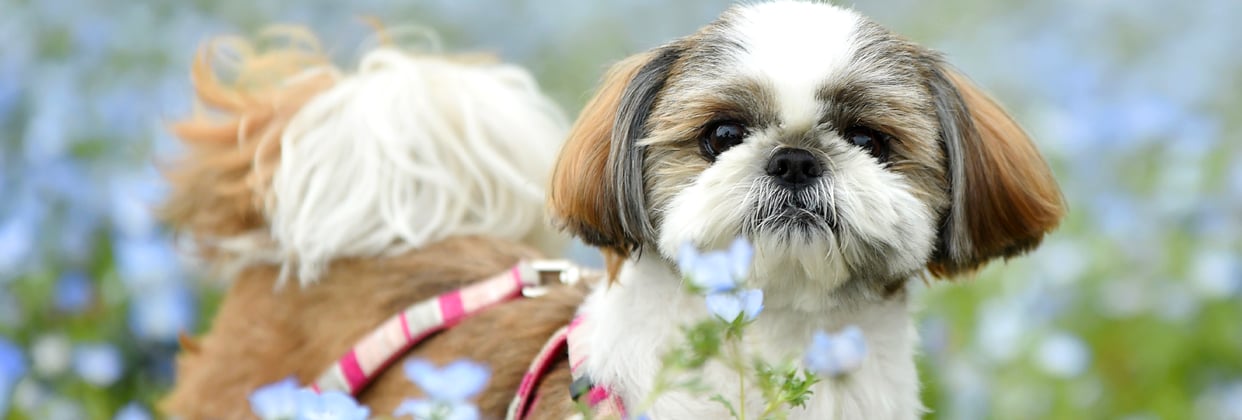

Temperament and behaviour.
Temperament
Shih Tzu are known for being friendly, affectionate, and sometimes a little stubborn. They were bred as companion dogs, so they love spending time on your lap—like a mini heater that never complains.
If you laugh, they might tilt their head, as if to say, “I’m with you all the way.” They’re also surprisingly alert, letting you know if visitors arrive with an excitable bark.
Do Shih Tzus make good pets?
Yes. They form close bonds with family, adapt well to apartment living, and typically greet strangers with a tail wag.
If you’re considering them as your first dog, remember they still require training and daily attention.
Even though they’re small, these pups want mental stimulation to stay happy.
Wondering if they’d suit a household with kids? Watch out for rough handling. They’re sturdy but not built for heavy horseplay.
For further tips on choosing your perfect family breed, check out our guide to the best breeds for first time owners.
Are Shih Tzus good with kids?
Usually, yes. They enjoy friendly company. But let’s train children to handle them gently.
Because of the brachycephalic face, they can be more delicate around the nose and Shih Tzu’s mouth area.
We suggest supervising younger kids, at least in the early days.
Are Shih Tzus good with cats?
Many adapt well, especially if they’re socialised with cats as puppies. They rarely have strong prey instincts, so a calm introduction can lead to a peaceful multi-pet household.


Behaviour
They thrive on playtime and cuddles. Shih Tzus love lap time but might get frustrated or anxious if left alone for too long.
They can bark if bored, so keep them entertained with puzzle toys or gentle adventures around the home. If you see signs of separation stress, pop into our separation anxiety guide for helpful ideas.
Do Shih Tzus suffer from separation anxiety?
Let’s be honest—Shih Tzus don’t exactly enjoy being left alone. These little shadows thrive on human company and often follow their owners from room to room, just to be nearby.
While they’re known for being laid-back and loving, this attachment can sometimes tip into separation anxiety if they’re left for long stretches.
You might come home to whining, pacing, or even a little mess on the floor. It’s not because they’re being naughty—they just miss you more than you might realise.
Training, gradual alone-time practice, and enrichment toys can all help ease their worry.
Are Shih Tzus good apartment dogs?
Shih Tzus are excellent apartment dogs thanks to their small size, gentle nature, and low exercise needs.
They’re happiest being close to their owners and don’t require large spaces to feel content.
While they do need daily walks and mental stimulation, they’re generally calm indoors and don’t have high energy levels like larger breeds.
Their friendly, people-oriented personality makes them a great choice for city or apartment living.
Training a Shih Tzu.
Are Shih Tzus smart?
They’re bright in a social sense. Problem-solving might not be their biggest strength, but they’ll quickly figure out who doles out the best treats.
They appreciate positive reinforcement, short sessions, and soft commands. Harsh discipline does not work for these sensitive souls.


House training
Shih Tzu puppies might take a bit longer to potty train compared to other breeds, likely due to their small bladder size.
Patience is key. Use frequent potty breaks, praise, and occasional treats. Note that they can be a tad stubborn, so remain consistent.
Shedding and grooming.
How often should I groom my Shih Tzu?
A Shih Tzu typically needs daily brushing if you keep a long coat. Alternatively, a puppy cut calls for professional trims every 4–6 weeks. Their hair grows continuously, so if you skip grooming, you’ll get mats pretty fast.
Don’t forget about ear care. Those floppy ears can trap moisture, leading to ear infections. Check them weekly, follow up with gentle cleaning. If you’re uncertain, see our guide to ear cleaning.
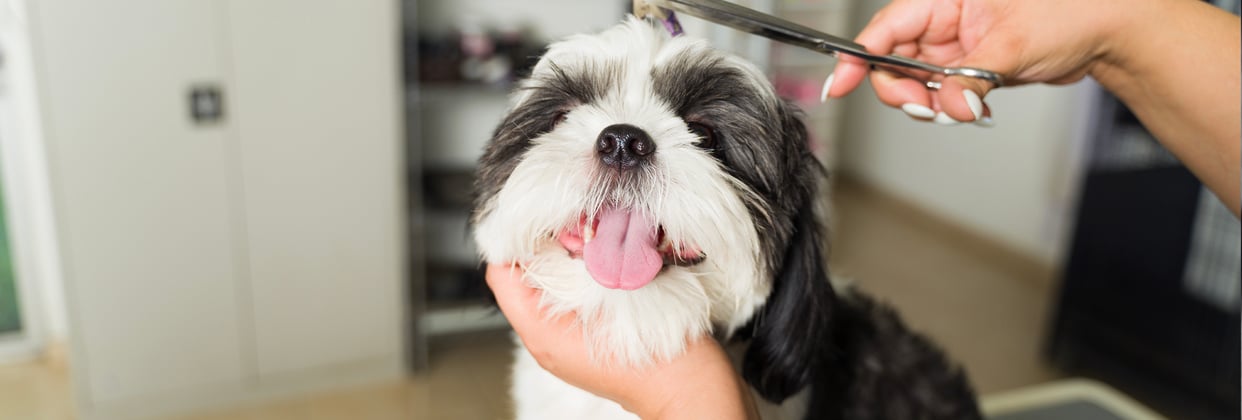

Exercise and mental stimulation.
Shih Tzu dogs may look fragile, but they still love a short daily walk—somewhere around 20–30 minutes. Because they’re brachycephalic, intense exercise in hot or humid weather can stress their airways. Gentle is best.
Indoors, puzzle games or hide-and-seek keep them mentally fit. If your pup is bored, they might bark or chew. For a dose of creative ideas, glance at our post "How To Make Your Dog Happy".’


Feeding and nutrition.
How much should I feed my Shih Tzu?
On average, adult Shih Tzus eat about 1/2 to 1 cup of quality dog food daily, split into two meals. Always watch your pup’s waistline—Shih Tzu is prone to obesity if overfed. Also, consider their brachycephalic muzzle when it comes to kibble size. Smaller kibble pieces can be easier for them to manage.
Curious about diet trends or best practices? Our grain-free dog food guide can help you decide if grain-free is right for your Shih Tzu.
Common health issues in Shih Tzus.
Like many brachycephalic breeds, Shih Tzu pups can face specific concerns. Keep a watchful eye on their breathing, eyes, and skin folds. Early vet checks make a huge difference. Below is a quick look at a few common issues:
Every Shih Tzu is different. Regular vet exams and consistent home care go a long way. If you notice laboured breathing, irritated eyes, or changes in appetite, don’t wait—visit your veterinarian.
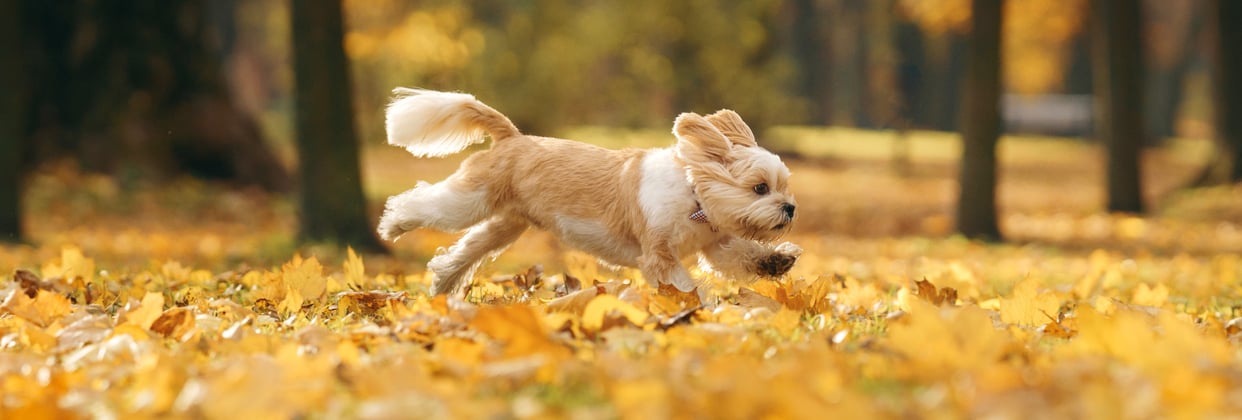

Pet insurance for Shih Tzus.
Because Shih Tzus can be prone to issues like brachycephalic airway complications and eye injuries, insurance may save you big down the road. If you want peace of mind covering those unexpected vet bills, check out our Shih Tzu Pet Insurance.
At Waggel, we offer:
Lifetime cover for hereditary conditions.
24/7 online vet triage through Joii.
Simple claims with no hidden jargon.
Get your free quote and become part of our family of protected pets.
